If the shortest distance between the straight lines $3(x-1)=6(y-2)=2(z-1)$ and $4(\mathrm{x}-2)=2(\mathrm{y}-\lambda)=(\mathrm{z}-3), \lambda \in \mathbf{R}$ is $\frac{1}{\sqrt{38}}$, then the integral value of $\lambda$ is equal to :
Correct Option: 1
$\mathrm{L}_{1}: \frac{(\mathrm{x}-1)}{2}=\frac{(\mathrm{y}-2)}{1}=\frac{(\mathrm{z}-1)}{3} \quad \overrightarrow{\mathrm{r}}_{1}=2 \hat{\mathrm{i}}+\hat{\mathrm{j}}+3 \mathrm{k}$
$\mathrm{L}_{2}: \frac{(\mathrm{x}-2)}{1}=\frac{\mathrm{y}-\lambda}{2}=\frac{\mathrm{z}-3}{4} \quad \overrightarrow{\mathrm{r}_{2}}=\hat{\mathrm{i}}+2 \hat{\mathrm{j}}+4 \hat{\mathrm{k}}$

Shortest distance $=$ Projection of $\vec{a}$ on $\vec{r}_{1} \times \vec{r}_{2}$
$=\frac{\left|\overrightarrow{\mathrm{a}} \cdot\left(\overrightarrow{\mathrm{r}}_{1} \times \overrightarrow{\mathrm{r}}_{2}\right)\right|}{\left|\overrightarrow{\mathrm{r}}_{1} \times \overrightarrow{\mathrm{r}}_{2}\right|}$
$\left|\overrightarrow{\mathrm{a}} \cdot\left(\overrightarrow{\mathrm{r}_{1}} \times \overrightarrow{\mathrm{r}_{2}}\right)\right|=\left|\begin{array}{rrr}1 & \lambda-2 & 2 \\ 2 & 1 & 3 \\ 1 & 2 & 4\end{array}\right|=|14-5 \lambda|$
$\left|\overrightarrow{\mathrm{r}}_{1} \times \overrightarrow{\mathrm{r}}_{2}\right|=\sqrt{38}$
$\therefore \frac{1}{\sqrt{38}}=\frac{|14-5 \lambda|}{\sqrt{38}}$
$\Rightarrow|14-5 \lambda|=1$
$\Rightarrow 14-5 \lambda=1$ or $14-5 \lambda=-1$
$\Rightarrow \lambda=\frac{13}{5}$ or 3
$\therefore$ Integral value of $\lambda=3$
Click here to get exam-ready with eSaral
For making your preparation journey smoother of JEE, NEET and Class 8 to 10, grab our app now.
